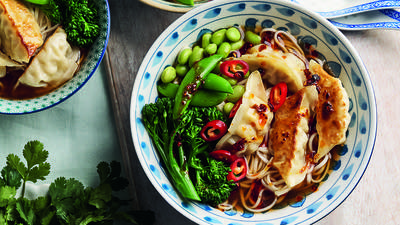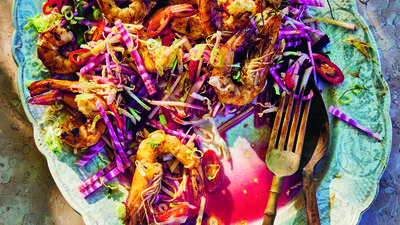
Which wine can you drink with all of these dishes: a bowl of Szechuan noodles, a delicate grilled fish, a Korean barbecued taco and salty caramel ice cream? The short answer is a white wine called Riesling.
Here in the U.S., Riesling is a sleeper wine. But if you go to the mothership -- the home of Riesling, Germany -- it’s the jewel in the crown. Wine writer Stuart Pigott moved from the U.K. to Germany two decades ago to study wine. In particular, Riesling.
Lynne Rossetto Kasper: How can a Riesling taste right with that whole range of flavors?
Stuart Pigott: Riesling is a wine that is light and refreshing but very strong and intense. It has an enormous range of nuance. You have wines ranging from the very dry to the very sweet, from the very light to the very powerful. Every possible combination is possible.
LRK: Does any other grape have this ability?
SP: I would love to find one. I think it would have considerable commercial potential.
LRK: That’s an interesting point because, at least in this country, we don’t know that much about Riesling. The popularity of other wines and other grapes is huge, but Riesling is nowhere near as popular.
SP: In a quiet way, Riesling has been growing rather fast the last years, even if it doesn’t make a big noise and doesn’t attract big headlines. It’s a grassroots thing. People just bump into the wine and discover they like it and start discovering its enormous gastronomic potential.
LRK: How can you tell on the bottle how sweet the wine is going to be? I’ve had Rieslings that are absolutely bone dry and I’ve had some that would be great with a salty caramel ice cream or a crème brulee. Is there a way of knowing on the bottle?
SP: Very often it says dry or sweet on the label. In recent years, you can also find a small graphic on the back label of many Rieslings that tells you exactly the level of sweetness of the wine. And look at the alcoholic content. If the alcoholic content is 10 percent or lower, it’s going to be a sweetish wine. The dry wines start around 11 percent.
LRK: Now this is one of the great wines of Germany, right?
SP: Of the world, I would say. A lot of very good Riesling is being made in America. It’s just not that well known. For example, in the Finger Lakes in upstate New York. In the north of Michigan. In Washington State. I would say those are the three most important regions, but there’s a bit of Riesling in a great many other places as well.
LRK: I knew about the Finger Lakes and I know about the Northwest, but I didn’t realize the peninsula of Michigan.
SP: Yes, the Old Mission and Leelanau Peninsula close to Traverse City in the north of Michigan produce some very fine Rieslings that are beautiful, elegant, generally just-off-dry wines.
LRK: Can you name some names for us?
SP: Chateau Grand Traverse is the most important producer up there. They call themselves the biggest Riesling producer east of the Rockies.
LRK: What about German Rieslings? I realize this is like asking you to pick your favorite child, but name some names that will give us a good sense of what a German Riesling is about.
SP: If you want to get a sense of what is happening now, the new generation of Riesling producers who have been coming up since the turn of the century, you really need to look for a dry wine from one of the leading young Turks. Philipp Wittmann is a role model for hundreds of wine growers who are even younger than he is. His wines manage to combine a considerable amount of body and power with this lightness of touch and this freshness which is so characteristic of Riesling wine.
[Ed: Here are three other Riesling recommendations from Pigott: Dr. Frank Vinifera Wine Cellars, Sheldrake Point Winery, Hermann J. Wiemer Vineyards.]
LRK: What would you eat with something like this?
SP: As long as the food is not terribly sweet or extremely spicy, you have an incredibly flexible wine. It will go with a great deal of particularly lighter foods, but if the steak isn’t slathered in barbecue sauce, it’s probably going to manage pretty well there, too.
LRK: A white wine with steak?
SP: No problem at all. We have so many fixed ideas -- even I do -- about which wine is going to go with which food. When you try things, there are an awful lot of big surprises. I think we really are at the beginning of the age of Riesling.
Before you go...
Each week, The Splendid Table brings you stories that expand your world view, inspire you to try something new, and show how food connects us all. We rely on your generous support. For as little as $5 a month, you can have a lasting impact on The Splendid Table. And, when you donate, you’ll join a community of like-minded individuals who love good food, good conversation, and kitchen companionship. Show your love for The Splendid Table with a gift today.
Thank you for your support.
Donate today for as little as $5.00 a month. Your gift only takes a few minutes and has a lasting impact on The Splendid Table and you'll be welcomed into The Splendid Table Co-op.




